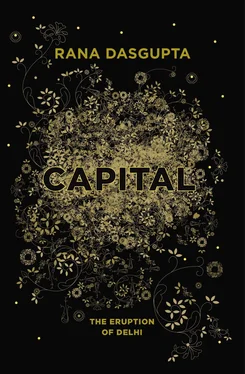“Coke has taken over everything. People want the feeling of cocaine. To catch a girl, to catch people. Rich people who do a party in their farmhouse, they can’t have it without that feeling. They are rich but they don’t feel rich without coke. If people do a farmhouse party they put down 5 lakhs on the coke.
“And coke is good for all these people who have to work. If you do Ecstasy or LSD the whole night, the next day you can’t do anything. Coke, you work the next day. I know so many people who have twenty-four-hour lives. Like that fucking politician — he doesn’t sleep for two or three days. He just finishes the night, puts some water on his face and a suit on and then he turns up at meetings fucking hyper, you can tell, you know. Coke is good for that. With other drugs you can’t. You are shattered next day. So now there’s no weekend: now every day is a weekend. People will call, ‘Dude, can you hook me up?’ and I’m like ‘Today is Monday!’
“Go to all the five-star hotels, the toilet’s always busy, mate! Even like all these lounge bars, it’s the same thing, everybody knows. They know if they tell one person not to do it then ten others won’t come. They don’t want to lose business. So they tolerate it. You need to have a crowd in your bar, so you can’t fuck around with the dope. Otherwise, next time they won’t come and they’ll tell everyone else too.
“You can get busted. But it doesn’t really happen. The cops take money and then they leave. It’s mostly just these black guys who get caught, they get really fucked. Most people who use coke are connected. So even when the cops arrest someone, they somehow get a call from somewhere else like, ‘Dude, that’s my friend, so take care.’ So they just say to him, ‘Pay us and fuck off.’ It’s a kind of business for them. Whenever they catch a politician’s son, it’s a jackpot.
“It’s much more in Delhi than other cities because the people who run things in Delhi are the people who already have money. They have property and businesses, and they live off that. So it doesn’t matter whether they work or not. No one sits at home doing nothing in Mumbai because you won’t find anyone else around you. Everybody else is at work. Even if they’re rich, they still work. They do all this shit and all, but the next morning you’ll see them in the office. Here in Delhi, it’s like more royal style. Delhi people call each other up in the afternoon and say, ‘Oh, what are you doing?’ — ‘Nothing really’ — ‘Okay, come for a drink love’ — and there you go. You go to their house, fucking every evening you will see ten or fifteen people. Mumbai doesn’t have time for that kind of stuff.
“The rich here are really fucked up. These people don’t even pay their servants and the people who work for them and all. But they can like spend on drugs like easily 50,000 rupees [$1,000] a night. Especially the boys — they spend too much money in Delhi: go to clubs, find a chick, buy a drink, buy coke. Partly because Delhi has fewer girls out than Mumbai. Guys are going crazy with competition. Girls are more sheltered in Delhi, they mostly live with their parents. In Mumbai they rent their own places like boys.
“I know this guy who lives in a farmhouse. I was in his house just yesterday. He doesn’t work. He’s all alone. When you enter his gates, you have to drive a kilometre to reach his palace. And he made his house like one of those old houses in London. The cars are fanned out in front. When he buys a car he spends more money than the cost of the car on modifications. Like whatever car he buys, he calls them and he’s like, put this shit, put that shit. So he’s got this row of Lamborghinis, Ferraris, Maseratis, Range Rovers. Vintage cars too. And all this guy thinks about is, ‘Okay, what guy can get me the best coke? Which girls are new in town?’ That’s all he does. And his friends are like that too. All of them are like that. They don’t need to work like a hundred years and they can spend so much money and still it won’t go away. He has a big big company and his money is made. So many of them in this city like that. They are fucking smart enough dude! A couple of them studied in Oxford and they’ve done like super things, but once this thing is in your head, everything is dead, everything.
“I see people lose everything. You lose your friends, you lose your family. You lose yourself. You go nuts. You go fucking nuts. People destroy everything, they don’t work, they lose themselves. So many of those dudes have done too much, they’re wired all the time, they can’t handle people you know, they’re fucking shivering and all, they start shouting. Like Trainspotting you know, they fucking freak out.”
• • •
Was this oligarchy happy? Strangely, perhaps, happiness did not seem to be among its more pronounced attributes. In order to understand why, we might ask another question: “How do you know you own what you own?”
In Western societies, where there was a long-standing and widespread capitalist consensus, the question caused less difficulty. Spiritual problems with money and property had been laid to rest long ago: contemporary Europeans could no longer empathise with the spiritual terror with which their Renaissance forbears contemplated the accumulation of profit. And in modern, democratic times, a consensual explanation had arisen for what some people owned and others did not: hard work. Over the previous century, the wealth of America’s financial elite, for instance, had derived less and less from inheritance and more and more from corporate salaries and bonuses. The rich could explain their privilege, therefore, through merit: they had excelled at university, they had shown intelligence and originality in the workplace, they had driven themselves to their limits, they had been promoted because of their skills — and it was quite proper that they should be rewarded with property, luxury and mobility. They did not need to ask themselves, as they drove home at night, if their mansion was really ‘theirs’ — if they were not, in fact, imposters, hucksters or criminals who merely ‘squatted’ in wealth. Their ownership of property was not just legal and theoretical: it accorded with their own inner sense, and indeed with society’s general opinion. It was all legitimate. What was theirs was ‘really’ theirs.
It was an absurd rationale. If hard work were really recompensed with property, many of the global poor would look out over rolling estates. If talent always found its way, the planet would not resound so deafeningly with the disappointment of wasted skill and ambition. But this was not the point. It was important to the functioning of a society that there be a consensus as to what constituted a legitimate basis for property, even if the whole thing was a delusion.
In the wake of an economic upheaval like India’s liberalisation, where enormous fortunes had simply been seized from the mêlée, the rich did not have such an easy time explaining how or why wealth had come to them, for they knew better than anyone else just how arbitrary the whole thing was. Their money had been acquired by a combination of elements — luck and connections, brute force and cunning — that had nothing individual about it at all. Anyone else could have done the same thing. Wealth remained, at some level, external: it did not feel ‘mine’. Looking at their houses and jets, they suffered from a profound misrecognition, like the impotent man whose mental image of himself has no penis, even though he can see the thing hanging between his legs. They found it difficult to feel rich. They enjoyed physical and legal control over their assets, but this did not translate into a secure inner feeling of ownership. They were fully aware of how unrepresentative they were of their poor country, and that society at large had little conviction that they deserved what they owned. They were regularly called thieves and pillagers, and the fact that they denied it vehemently did not mean that they did not believe it themselves. “Why has this come to me?” they asked themselves and, since the answer took them into places they did not want to go, they were addicted to distraction. But even Delhi’s endless drugs and parties could not cut off the anxiety that all this stuff might be taken away from them as easily and quickly as it had come. It was a Hindu idea of wealth too: the goddess Lakshmi, she of the gold coins, was always only a visitor. She had to be coaxed into one’s house at diwali time and, given the great whimsy of the Hindu cosmos, she could depart at any time. Every morning the Hindu shopkeepers said prayers to her: not today, Mother Lakshmi, do not leave me today.
Читать дальше











